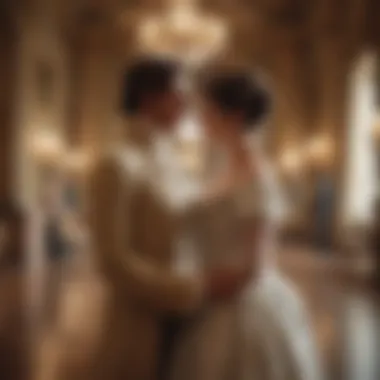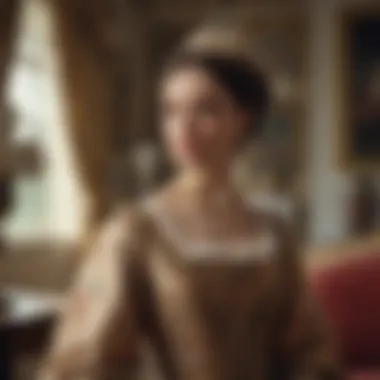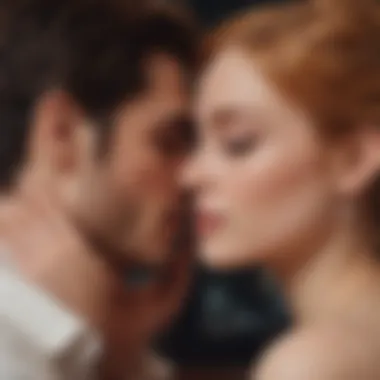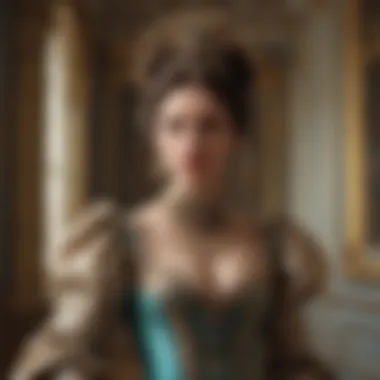Cinematic Inspirations: Films Reflecting Bridgerton's Charm


Intro
The cultural landscape of cinema is ever-evolving, and within it lies a treasure trove of films that resonate with the essence of popular series like Bridgerton. This series has captured the hearts of many, presenting a beautifully woven tapestry of romance, societal dynamics, and the pursuit of love amidst opulent settings. As we navigate through this exploration of films that echo similar themes, it is crucial to examine the ways these films reflect on tender relationships, moral dilemmas, and the complexity of human emotions.
Each selected film embodies the intricate balance of character-driven narratives and rich aesthetic experiences, inspired by the allure of Bridgerton. Viewers can find in these films an invitation to explore the nuances of affection, social constraints, and desire, all wrapped in cinematic excellence.
As we delve deeper into this analysis, we will highlight the sociocultural significance of these films, how they play with genre conventions, and their role in contemporary storytelling. Readers will gain insights into selections that resonate with the charm, intrigue, and emotional depth that fans have come to adore in Bridgerton.
"Cinema can represent society’s complexities and simplicity, allowing us to reflect on our own realities through the lens of love and relationships."
Stay tuned as we uncover trending topics and offer guides to understanding the cinematic gems aligned with this beloved series.
Prelims to Bridgerton
Bridgerton has become a cultural sensation since its debut on Netflix. This television series offers an innovative blend of romance, societal intrigue, and lavish visuals. Its impact extends beyond entertainment, influencing how period dramas are perceived and created. The series redefines storytelling by merging traditional regency motifs with modern sensibilities. It invites diverse audiences, specifically women, to revel in intricate love stories set against a backdrop of historical context.
A noteworthy aspect of Bridgerton is its commitment to nuanced character development. Characters are multifaceted, exhibiting a range of emotions and motivations that make them relatable. The relationships depicted are not merely romantic but are also reflective of broader societal themes. This complexity resonates with viewers and inspires discussions about identity, privilege, and love.
In the following subsections, we will explore two critical elements: the cultural impact of Bridgerton and its portrayal of a reimagined regency era. These aspects are essential as they set the foundation for understanding films that carry similar themes. They also illustrate how Bridgerton has paved the way for a new wave of romantic cinema.
The Cultural Impact of Bridgerton
Bridgerton has reshaped the landscape of period dramas. Its popularity has sparked conversations surrounding diversity and representation. The casting choices reflect a commitment to inclusivity rare in traditional adaptations of historical narratives. This has allowed audiences from different backgrounds to see themselves in the characters, elevating the viewing experience.
Moreover, the series has spurred significant interest in historical research and fashion, making Regency-era aesthetics desirable once again. From the costumes to the intricate set designs, these elements not only enhance visual appeal but also broaden cultural discussions about past societal norms and their relevance today.
"Bridgerton pioneers a space where stories can be told from various perspectives, thus enriching the genre."
The cultural footprint of Bridgerton extends to merchandise, social media discussions, and events that celebrate its themes. Audiences engage fervently online, sharing their interpretations and analyses of character arcs and plot developments. This kind of engagement marks a shift from passive consumption to active participation in cultural dialogue.
A Reimagined Regency Era
The portrayal of the Regency era in Bridgerton is not a mere historical reenactment; it is a clever reimagining that emphasizes modern values. The series uses its historical setting to depict timeless themes of love, ambition, and societal constraints. While the costumes and settings pay homage to the period, the characters often challenge normative expectations.
For instance, women in Bridgerton do not solely seek marriage as their ultimate goal. They pursue autonomy, friendship, and self-fulfillment. This offers a fresh perspective on the limited roles often portrayed in traditional narratives.
Thus, Bridgerton serves as a critical lens through which to examine how historical settings can be adapted to reflect contemporary ideals. It creates a narrative space where audiences can reflect on the past while engaging with the present, making it an ideal gateway to explore similar films in the ensuing sections.
Characteristics of Bridgerton-like Movies
In the landscape of cinema, certain films resonate with audiences due to their themes and aesthetics. The Bridgerton series exemplifies this connection, influencing a genre that combines romance, historical context, and depth in character. This section examines the characteristics that define movies similar to Bridgerton, highlighting their importance in fostering engaging narratives and appealing visuals.
Romance at the Forefront
Romance serves as a foundational pillar in films echoing the essence of Bridgerton. The complexity of love stories matters as they often reflect the human experience. Films like Pride and Prejudice adaptations and Emma showcase intricate romantic entanglements. These narratives are not simply about love at first sight; they explore emotional conflicts, societal pressures, and personal growth. Audiences are drawn to the rich emotional arcs, finding connection and relatability within the challenges faced by the characters.
Historical Settings and Costumes


Historical settings provide a backdrop that enhances the narrative. The Regency era, with its distinct fashion and social customs, captures viewers' imaginations. Costumes in films resembling Bridgerton define their visual identity. The details of costumes, from lavish ball gowns to intricate tailoring of men's suits, invite audiences into a different time. They emphasize the stark contrast between societal roles and personal desires. The attention to detail in production design elevates the storytelling, adding a layer of authenticity that resonates with viewers.
Complex Character Development
One hallmark of films that echo Bridgerton is the depth of its characters. Unlike one-dimensional portrayals, these films present multifaceted characters with realistic motivations and flaws. The development journey of characters makes their relationships compelling. For example, the evolution of Elizabeth Bennet in various adaptations demonstrates growth against societal expectations. Dynamic characters captivate audiences and encourage viewers to reflect on their own lives and relationships.
Intricate Plot Twists
Plot twists play a crucial role in engaging storylines. Films influenced by Bridgerton often weave together unexpected turns that maintain suspense. The overlapping themes of romance and drama typically require strategic storytelling that captivates viewers. Intricate plots compel the audience to reconsider initial assumptions about characters and motives. The thrill of surprise can elevate the viewing experience, making it memorable and discussions-worthy long after the credits roll.
Romantic Dramas Influenced by Bridgerton
Romantic dramas play a significant role in the emotional landscape of cinema. These films often capture the essence of love through intricate character arcs, compelling storylines, and timeless settings. The influence of Bridgerton on this genre is profound. Its remarkable blend of romance and drama, paired with vibrant visuals and dynamic characters, has inspired numerous adaptations and reinterpretations of classic literature. This section delves into two notable adaptations within this context.
Pride and Prejudice Adaptations
Pride and Prejudice remains one of the most adapted novels in history, resonating across cultures and generations. Each adaptation seeks to reflect not only the original text’s romantic undertones, but also the evolving societal norms. Notable adaptations, like the 2005 film starring Keira Knightley, emphasize emotional depth and complex relationships. This rendition is particularly influenced by the lively tone and visual splendor akin to Bridgerton.
Many adaptations spotlight the social constraints placed on women in previous centuries. The manner in which Elizabeth Bennet navigates these boundaries often mirrors the struggles faced by the heroines in Bridgerton. The historical backdrop, filled with lavish settings and period costumes, captivates audiences much like the Bridgerton series does. This connection fosters a dialogue on love and social status, making it relevant for today's viewers.
Emma: A Timeless Love Story
Emma, another Jane Austen classic, presents a narrative rich with miscommunication and social maneuvering. This tale of matchmaking and romantic misunderstanding parallels the intrigues found in Bridgerton. The character of Emma Woodhouse is layered; she embodies both strength and vulnerability, often resulting in humorous predicaments.
The 2020 film adaptation, featuring Anya Taylor-Joy, brings a contemporary flair to the classic story. The cinematography and costume design echo the elegance seen in Bridgerton. Both the film and the series convey a sense of playfulness, resonating with audiences who appreciate the complexities of romance. As Emma learns about love, the audience is taken on a journey that interweaves themes of personal growth and societal expectations.
"Romantic dramas, like those influenced by Bridgerton, showcase not only love stories but also societal contexts that shape these relationships."
In summary, romantic dramas inspired by Bridgerton do more than entertain. They provoke thought about love, identity, and societal roles, making them essential viewing for anyone captivated by the themes of this popular series.
Period Films with Modern Appeal
Period films are frequently nuanced narratives that capture the complexities of society while presenting historical context. This section underscores the significance of period films with modern appeal, especially for those who appreciate Bridgerton. These films not only reflect on historical eras but also infuse contemporary perspectives that resonate with today’s audience. They serve as an entry point into understanding cultural shifts and societal norms throughout history.
The intersection of style and substance creates a compelling viewing experience. From visually stunning costumes to intricately designed sets, these films attract attention and evoke a sense of escapism. Additionally, the intricate characterization brings depth to the narrative, further engaging the viewers. Moreover, period films today often spotlight themes such as gender roles, class dynamics, and romance, providing both entertainment and thought-provoking content. This blend of historical reverence with modern sensibilities allows audiences to draw parallels between past and present, enriching their encounter with the stories.
Ultimately, the popularity of these films lies in their ability to evoke emotions and stimulate discussions. By bridging eras, they present an opportunity to reflect on societal evolution, which is particularly appealing to those who admire the rich storytelling of Bridgerton.
The Favourite: A Near-Contemporary Take
The Favourite stands out as a film that skilfully explores complex relationships in a historical context while employing modern wit and style. The narrative revolves around Queen Anne and her two close aides, Sarah and Abigail, showcasing the tumultuous political landscape of early 18th-century England. The screenplay is sharp and filled with humor, yet it retains a sincerity that grounds the characters.
Visually, the film is striking. The costumes designed by Sandy Powell are lavish and immersive, reflecting the historical period effectively. The cinematography captures the essence of the era while incorporating a contemporary aesthetic that feels fresh. This approach makes The Favourite distinct, appealing not only to history enthusiasts but also to those who cherish modern storytelling techniques.
The character dynamics in The Favourite are intricate. It examines themes of power, manipulation, and relationships, showcasing a world where ambition drives individuals to unexpected outcomes. This complexity allows viewers to engage with the narrative on both an emotional and intellectual level.
In essence, The Favourite provides a lens through which we can explore notions of loyalty and betrayal, making it a perfect candidate for those enchanted by the blend of historical setting and modern narrative structure.
Little Women: A Fresh Perspective


Little Women, directed by Greta Gerwig, brings a renewed vision to Louisa May Alcott's classic tale. The narrative follows the lives of the March sisters: Meg, Jo, Beth, and Amy. Gerwig's adaptation is thoughtful, emphasizing the aspirations and struggles of women during the Civil War era
The film diverges from typical period dramas by focusing on female empowerment and independence. Each sister embodies different aspects of womanhood and ambition, making them relatably modern. The struggles they face reflect contemporary themes like gender roles, personal growth, and familial bonds while still anchored in their historical setting.
Visually, Little Women is beautiful. The soft color palette enhances the emotional undertones, while the clothing reflects both the period and the personalities of the characters. The attention to detail in the film draws viewers into the world of the March sisters.
Moreover, the storytelling structure in Little Women oscillates between different timelines. This non-linear approach adds depth to the characters, allowing for richer character development. The audience witnesses not only their youth but also their journey towards adulthood, capturing the trials and tribulations along the way.
In summary, Little Women offers a fresh perspective on a beloved story. It resonates with both historical accuracy and modern relevance, making it an essential film for fans of period dramas seeking deeper insights and relatable stories.
Television Series Worth Watching
In the realm of cinema inspired by Bridgerton, television series play a critical role. They often allow for more in-depth exploration of characters and themes compared to films. The complexity of relationships and socio-political intricacies can be articulated better in the serial format. Series can delve into narratives that require time for development, creating emotional depth that resonates with viewers. In this context, several notable shows come to the forefront, deserving a closer examination.
The Affair: Relationships Deconstructed
The Affair intricately examines the emotional and psychological ramifications of infidelity. This show stands out for its narrative structure, employing multiple perspectives to reveal how perceptions shape reality. Each character presents their unique viewpoint, providing layers to the story that echo the complexities seen in Bridgerton’s character dynamics. The intimate portrayal of relationships, coupled with scenic backgrounds, creates an engaging experience.
The show doesn't sugarcoat love and romance. Instead, it digs into the messiness of human emotions. This raw and sometimes painful journey invites viewers to reflect on the nature of their own relationships. The character development is carefully crafted, allowing for moments of vulnerability and growth. Just like Bridgerton, the series explores love beyond the surface, revealing deeper motivations that drive behaviors.
Outlander: Historical Intrigue and Passion
Outlander is a remarkable fusion of history, romance, and adventure. The series navigates through time, showcasing the tumultuous relationship between Claire and Jamie. Set against the backdrop of the Jacobite risings, it offers a rich tapestry of historical events intertwined with personal narratives. This precise blending of historical intrigue with passionate romance creates a compelling viewing experience.
The chemistry between the leads is palpable, drawing viewers into their world. The historical elements serve to heighten the stakes of their love story, making the drama more engaging. Each episode is meticulously crafted to balance romance with the broader socio-political environment, much like how Bridgerton employs its setting to enrich its narrative. In both series, the passion and tension are heightened by historical contexts, making the personal political.
By exploring these series, audiences can gain further understanding of how modern adaptations of historical narratives continue to captivate viewers. The interplay of deep character studies, emotional conflicts, and lush settings mirrors the essence of what Bridgerton offers.
Documentaries with a Historical Lens
Documentaries that focus on history provide invaluable insights into the past, shaping our understanding of the societal and cultural frameworks that have influenced contemporary narratives. This section explores how documentaries can enhance the viewing experience for enthusiasts of period dramas, particularly those drawn to the elegance and intricate social dynamics found in Bridgerton. These documentaries offer a critical lens on the real events and people of the Regency era, allowing audiences to appreciate the historical context behind their favorite fictional tales.
By delving into documentaries, viewers can explore various dimensions of the Regency era, from the societal norms to the personal lives of figures that inspired many characters in fictional narratives. Understanding these elements is essential for anyone intrigued by the romanticized representations in films and shows. The intersection of real historical facts with artistic interpretations often leads to deeper engagement with the stories.
The Real Bridgerton: History and Society
This documentary provides a fascinating exploration of the society that inspired Julia Quinn's novels. By examining actual social dynamics, class structures, and gender roles of the early 19th century, it helps viewers understand the intricacies of the time. It reflects on how Bridgerton captures these elements while adding layers of drama and romance.
The documentary introduces audiences to historical figures and events that parallel the fictional narratives. Important aspects include:
- Social Classes: An overview of the differences between the upper class and the working class.
- Marriage and Family: Insight into how matchmaking and marriages were viewed and the strategies involved.
- Cultural Events: A look at the significance of balls and gatherings in socializing and establishing connections.
This combination of real-world context and cinematic storylines enriches the viewing experience.
Secrets of the Regency Era
The Secrets of the Regency Era documentary delves into lesser-known aspects of this historical period. It challenges popular misconceptions while providing thorough analysis and context. The film highlights various societal practices that may not be prominently featured in romantic dramas but are crucial to understanding the era's complexities.


Some key focus points include:
- Fashion Trends: A look at how fashion reflected social status and modern ideals.
- Economic Factors: How economics influenced romance and family relations.
- Innovations: Exploration of inventions and ideas that shaped life during the Regency period.
This documentary serves as a vital resource for those looking to understand the subtleties of the era and offers a more nuanced viewpoint than what is typically portrayed in mainstream media. By recognizing these underlying elements, audiences can develop a richer knowledge base when consuming works reminiscent of Bridgerton.
Exploring Diverse Perspectives
The exploration of diverse perspectives in cinema has become increasingly vital in contemporary storytelling. In the context of movies that echo the essence of Bridgerton, it invites audiences to engage with narratives that reflect a wider range of experiences and identities. These films not only enrich the viewing experience but also challenge traditional genre conventions, broadening the horizons of how romance and period dramas are perceived.
Emphasizing diversity allows filmmakers to portray complex characters beyond the usual tropes. It is essential to highlight films that showcase strong female leads, as these narratives often center on empowerment, individuality, and resilience. Furthermore, integrating intersectionality into romantic narratives sheds light on the multifaceted nature of love, identity, and cultural backgrounds. This benefits the audience by presenting more relatable characters and situations, fostering empathy and understanding.
Diverse storytelling also resonates with contemporary viewers, particularly women of all ages. By engaging with various intersections of race, class, sexuality, and gender, audiences can see themselves reflected on screen. The importance of this representation cannot be overstated; it reveals the richness of human experiences, encouraging dialogue and reflection on societal norms and issues. Through these compelling narratives, viewers can appreciate diverse cultures and experiences, which ultimately enhances their connection to the stories being told.
"Films that embrace diversity can revamp tired narratives, leading to refreshing insights and genuine emotional resonance."
Films Featuring Strong Female Leads
Films featuring strong female leads have garnered considerable attention in the realm of cinema. These protagonists often embody strength, resilience, and complexity, which allows audiences to connect on a deeper level. In a narrative landscape previously dominated by traditional depictions of women, these films break ground, showcasing female characters who take charge of their destinies.
For example, consider Pride and Prejudice adaptations where characters like Elizabeth Bennet are portrayed as outspoken and intelligent, challenging social norms of their era. Similarly, Emma presents its titular character as flawed yet relatable, emphasizing personal growth and self-discovery beyond romantic pursuits. These representations encourage viewers to appreciate the strength inherent in vulnerability.
By spotlighting strong female leads, filmmakers create space for discussions about gender dynamics, agency, and independence. Their journeys resonate across varying demographics, offering valuable insights into the diverse experiences of women, historically and contemporarily.
Intersectionality in Romantic Narratives
Intersectionality in romantic narratives adds depth and richness to storytelling by weaving together multiple identities within the same narrative. This approach complicates the traditional romantic plot, showcasing how various aspects of identity—such as race, class, and sexuality—intersect to shape individuals' experiences of love and relationships.
Films like The Favourite illustrate this well, as they present a love story that intertwines personal desires with political machinations. The intersecting identities of the characters challenge the audience to rethink preconceived notions about love and power dynamics.
Furthermore, embracing intersectionality allows for a more inclusive representation of romance. Audiences can engage with stories that reflect diverse relationships, shifting away from monolithic depictions of love. This nuance enriches the viewing experience, making it relatable to individuals from varied backgrounds. Through layered narratives, filmmakers can emphasize that love is not just a universal experience but is deeply influenced by one's identity and context.
In summary, exploring diverse perspectives in cinema is essential for promoting understanding and representation. By focusing on strong female leads and integrating intersectionality into romantic narratives, films can reflect a broader spectrum of human experience. This endeavor enhances narratives and helps build a richer, more inclusive cinematic landscape.
Ending: The Enduring Allure of Love Stories
The exploration of love stories continues to captivate audiences across generations. In the context of our analysis, the conclusion sheds light on the elements and themes that make films echo the essence of Bridgerton. Each narrative, infused with romance and depth, invites viewers to experience profound emotional journeys.
Why These Films Resonate Today
Films that share the essence of Bridgerton resonate with audiences for several reasons. First, romance remains an evergreen theme. It appeals to fundamental human emotions, enabling viewers to connect on a personal level. In today’s environment, where fast-paced life often disrupts genuine connections, these films provide an escape. They deliver stories where love triumphs over obstacles, thus reinforcing hope and vulnerability.
Furthermore, strong narratives aimed particularly at women and underrepresented groups are gaining prominence. Films often focus on characters who break societal norms and seek personal fulfillment. This shift reflects broader societal changes, allowing diverse voices to tell compelling romantic tales. Characters like those seen in Pride and Prejudice adaptations resonate due to their relatability, finding empowerment within historical constraints.
Finally, the historical context of these films adds richness. The elaborate costumes and well-crafted settings transport audiences to different eras. This visual aspect is often enhanced by contemporary storytelling techniques, making them appealing to a wider audience, including those who might not typically engage with period pieces. Thus, the enduring allure continues to thrive in the cinematic landscape.
The Future of Romantic Period Cinema
The future of romantic period cinema appears promising, driven by evolving audience preferences. Filmmakers are experimenting more with narratives, producing visually stunning films that also challenge traditional romantic tropes. As societal conversations about love and relationships develop, so do the stories we see on-screen. Unlike past portrayals, today's films are likely to include more diverse relationships and redefine romantic ideals.
Additionally, the influence of streaming platforms cannot be overlooked. With more access to content, viewers develop broader tastes. We may see a rise in hybrid genres that combine historical romance with fantasy or science fiction. This innovation can lead to richer stories, capturing the imagination while honoring romantic roots.
The engagement with romantic period films also poses a unique opportunity for filmmakers. By incorporating modern themes, such as intersectionality and gender roles, they can connect the historical with the present. This approach can lead to enhanced equity in representation, appealing to a new generation of viewers.
In a world where stories matter, romantic cinema continues to serve as a medium for exploring love's complexities.



